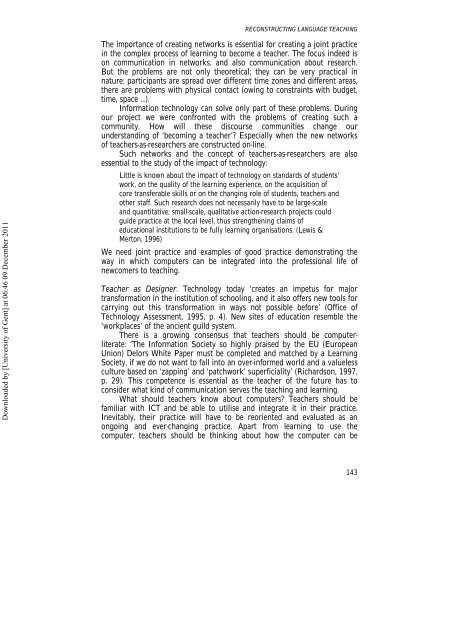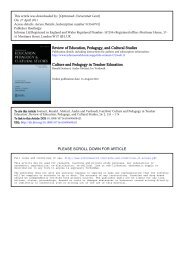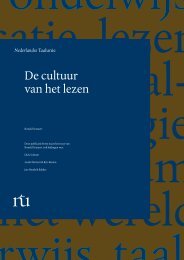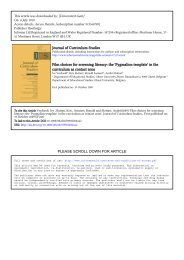a view informed by the problems of traditional literacy in a digital age
a view informed by the problems of traditional literacy in a digital age
a view informed by the problems of traditional literacy in a digital age
You also want an ePaper? Increase the reach of your titles
YUMPU automatically turns print PDFs into web optimized ePapers that Google loves.
Downloaded <strong>by</strong> [University <strong>of</strong> Gent] at 06:46 09 December 2011<br />
RECONSTRUCTING LANGUAGE TEACHING<br />
The importance <strong>of</strong> creat<strong>in</strong>g networks is essential for creat<strong>in</strong>g a jo<strong>in</strong>t practice<br />
<strong>in</strong> <strong>the</strong> complex process <strong>of</strong> learn<strong>in</strong>g to become a teacher. The focus <strong>in</strong>deed is<br />
on communication <strong>in</strong> networks, and also communication about research.<br />
But <strong>the</strong> <strong>problems</strong> are not only <strong>the</strong>oretical; <strong>the</strong>y can be very practical <strong>in</strong><br />
nature: participants are spread over different time zones and different areas,<br />
<strong>the</strong>re are <strong>problems</strong> with physical contact (ow<strong>in</strong>g to constra<strong>in</strong>ts with budget,<br />
time, space …).<br />
Information technology can solve only part <strong>of</strong> <strong>the</strong>se <strong>problems</strong>. Dur<strong>in</strong>g<br />
our project we were confronted with <strong>the</strong> <strong>problems</strong> <strong>of</strong> creat<strong>in</strong>g such a<br />
community. How will <strong>the</strong>se discourse communities change our<br />
understand<strong>in</strong>g <strong>of</strong> ‘becom<strong>in</strong>g a teacher’? Especially when <strong>the</strong> new networks<br />
<strong>of</strong> teachers-as-researchers are constructed on-l<strong>in</strong>e.<br />
Such networks and <strong>the</strong> concept <strong>of</strong> teachers-as-researchers are also<br />
essential to <strong>the</strong> study <strong>of</strong> <strong>the</strong> impact <strong>of</strong> technology:<br />
Little is known about <strong>the</strong> impact <strong>of</strong> technology on standards <strong>of</strong> students’<br />
work, on <strong>the</strong> quality <strong>of</strong> <strong>the</strong> learn<strong>in</strong>g experience, on <strong>the</strong> acquisition <strong>of</strong><br />
core transferable skills or on <strong>the</strong> chang<strong>in</strong>g role <strong>of</strong> students, teachers and<br />
o<strong>the</strong>r staff. Such research does not necessarily have to be large-scale<br />
and quantitative; small-scale, qualitative action-research projects could<br />
guide practice at <strong>the</strong> local level, thus streng<strong>the</strong>n<strong>in</strong>g claims <strong>of</strong><br />
educational <strong>in</strong>stitutions to be fully learn<strong>in</strong>g organisations. (Lewis &<br />
Merton, 1996)<br />
We need jo<strong>in</strong>t practice and examples <strong>of</strong> good practice demonstrat<strong>in</strong>g <strong>the</strong><br />
way <strong>in</strong> which computers can be <strong>in</strong>tegrated <strong>in</strong>to <strong>the</strong> pr<strong>of</strong>essional life <strong>of</strong><br />
newcomers to teach<strong>in</strong>g.<br />
Teacher as Designer. Technology today ‘creates an impetus for major<br />
transformation <strong>in</strong> <strong>the</strong> <strong>in</strong>stitution <strong>of</strong> school<strong>in</strong>g, and it also <strong>of</strong>fers new tools for<br />
carry<strong>in</strong>g out this transformation <strong>in</strong> ways not possible before’ (Office <strong>of</strong><br />
Technology Assessment, 1995, p. 4). New sites <strong>of</strong> education resemble <strong>the</strong><br />
‘workplaces’ <strong>of</strong> <strong>the</strong> ancient guild system.<br />
There is a grow<strong>in</strong>g consensus that teachers should be computerliterate:<br />
‘The Information Society so highly praised <strong>by</strong> <strong>the</strong> EU (European<br />
Union) Delors White Paper must be completed and matched <strong>by</strong> a Learn<strong>in</strong>g<br />
Society, if we do not want to fall <strong>in</strong>to an over-<strong><strong>in</strong>formed</strong> world and a valueless<br />
culture based on ‘zapp<strong>in</strong>g’ and ‘patchwork’ superficiality’ (Richardson, 1997,<br />
p. 29). This competence is essential as <strong>the</strong> teacher <strong>of</strong> <strong>the</strong> future has to<br />
consider what k<strong>in</strong>d <strong>of</strong> communication serves <strong>the</strong> teach<strong>in</strong>g and learn<strong>in</strong>g.<br />
What should teachers know about computers? Teachers should be<br />
familiar with ICT and be able to utilise and <strong>in</strong>tegrate it <strong>in</strong> <strong>the</strong>ir practice.<br />
Inevitably, <strong>the</strong>ir practice will have to be reoriented and evaluated as an<br />
ongo<strong>in</strong>g and ever-chang<strong>in</strong>g practice. Apart from learn<strong>in</strong>g to use <strong>the</strong><br />
computer, teachers should be th<strong>in</strong>k<strong>in</strong>g about how <strong>the</strong> computer can be<br />
143





